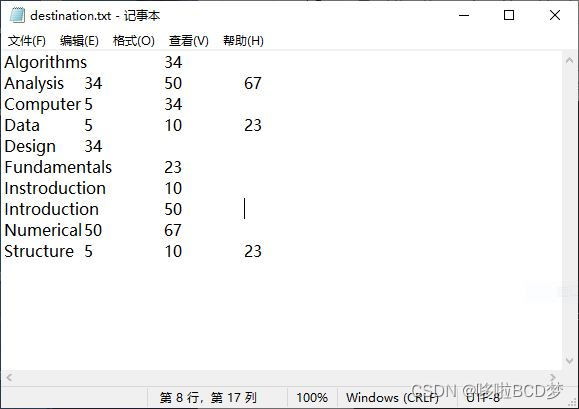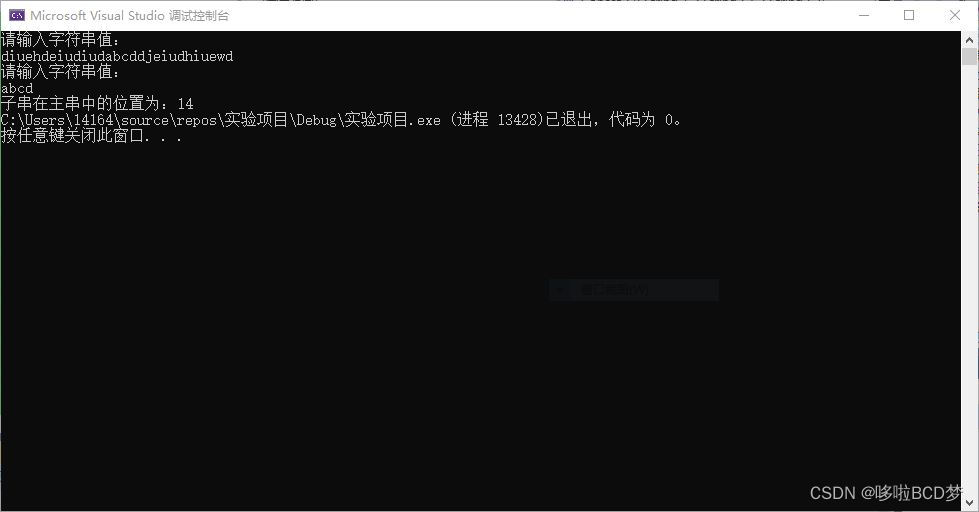头文件String.h
#pragma once
#include <stdio.h>
#include <stdlib.h>
#include <string.h>
#define MAXSTRLEN 255
#define FALSE 0
#define TRUE 1
#define ERROR 0
#define OK 1
#define OVERFLOW -1
#define CHUNKSIZE 80
#define MAXLINELEN 500
#define BONOLEN 3
#define MAXWORDNUM 10
#define MAXNORWORD 6
//串的顺序存储Sequence String,0位置用来存储串长
typedef unsigned char SString[MAXSTRLEN];
typedef int Status;
void SStringAssign(SString S)
{
printf("请输入字符串值:\n");
gets(&(S[1]));
S[0] = strlen(&(S[1]));
}
Status Concat_S(SString T, SString S1, SString S2) //串S1与串S2拼接为串T,超出部分被裁
{ //减
int uncut;
if (S1[0] + S2[0] <= MAXSTRLEN)
{
T[0] = S1[0] + S2[0];
for (int i = 1; i <= S1[0]; i++)
T[i] = S1[i];
for (int i = S1[0] + 1; i <= S1[0] + S2[0]; i++)
T[i] = S2[i - S1[0]];
uncut = TRUE;
}
else
{
if (S1[0] < MAXSTRLEN)
{
T[0] = MAXSTRLEN;
for (int i = 1; i <= S1[0]; i++)
T[i] = S1[i];
for(int i=S1[0]+1;i<=MAXSTRLEN;i++)
T[i] = S2[i - S1[0]];
uncut = FALSE;
}
else
{
T[0] = MAXSTRLEN;
for (int i = 1; i <= S1[0]; i++)
T[i] = S1[i];
uncut = TRUE;
}
}
return uncut;
}
Status SubString_S(SString Sub, SString S, int pos, int len)
{
if (pos<1 || pos>S[0] || len<0 || len>S[0] - pos + 1)
return ERROR;
Sub[0] = len;
for (int i = pos; i <= pos + len - 1; i++)
Sub[i - pos + 1] = S[i];
return OK;
}
//堆分配存储方式(动态分配串长)
typedef struct
{
char* ch;
int length;
}HString;
Status StrInsert_H(HString* S, HString T, int pos)
{
if (pos<1 || pos>S->length + 1)
return ERROR;
char* p;
p = (char*)realloc(S->ch, sizeof(char) * (S->length + T.length));
if (!p) exit(OVERFLOW);
S->ch = p;
for (int i = S->length - 1; i >= pos - 1; i--)
S->ch[i + T.length] = S->ch[i];
for (int i = 0; i <= T.length - 1; i++)
S->ch[pos - 1 + i] = T.ch[i];
S->length += T.length;
return OK;
}
Status StrAssign_H(HString* S, char* chars)
{
int i = 0;
for (char* c = chars; *c; ++i, ++c);
if (!i)
{
S->ch = NULL;
S->length = 0;
}
else
{
S->ch = (char*)malloc(sizeof(char) * (i + 1));
if (!S->ch) exit(OVERFLOW);
for (int j = 0; j <= i - 1; j++)
S->ch[j] = chars[j];
S->ch[i] = '\0';
S->length = i;
}
return OK;
}
int StrLength_H(HString S)
{
return S.length;
}
int StrCompare_H(HString S, HString T)
{
for (int i = 0; i < S.length && i < T.length; i++)
if (S.ch[i] != T.ch[i])
return S.ch[i] - T.ch[i];
return S.length - T.length;
}
Status ClearString_H(HString* S)
{
if (S->ch)
{
free(S->ch);
S->ch = NULL;
}
S->length = 0;
return OK;
}
Status StrConcat_H(HString* T, HString S1, HString S2)
{
if (T->ch) free(T->ch);
T->ch = (char*)malloc(sizeof(char) * (S1.length + S2.length));
if (!T->ch) exit(OVERFLOW);
for (int i = 0; i <= S1.length - 1; i++)
T->ch[i] = S1.ch[i];
for (int i = S1.length; i <= S1.length + S2.length; i++)
T->ch[i] = S2.ch[i - S1.length];
T->length = S1.length + S2.length;
return OK;
}
Status SubString_H(HString* Sub, HString S, int pos, int len)
{
if (pos<1 || pos>S.length || len<0 || len>S.length - pos + 1)
return ERROR;
if (Sub->ch) free(Sub->ch);
if (!len)
{
Sub->ch = NULL;
Sub->length = 0;
}
else
{
Sub->ch = (char*)malloc(sizeof(char) * len);
if (!Sub->ch) exit(OVERFLOW);
for (int i = 0; i <= len - 1; i++)
Sub->ch[i] = S.ch[pos - 1 + i];
Sub->length = len;
}
return OK;
}
//串的块链存储表示(直接用链式存储导致存储密度太低,采取块链存储方式改善)
typedef struct Chunk
{
char ch[CHUNKSIZE];
struct Chunk* next;
}Chunk;
typedef struct
{
Chunk* head, * tail;
int len;
}LString; //LinkString
//串的模式匹配算法
void Get_Next(SString S, int* next)
{
int i = 1, j = 0; //i所指的下一位为要求next值的位置,j所指为i的next值
next[1] = 0; //若j无法为i的下一位提供有用的next信息,则用j的next
while (i < S[0]) //继续寻找,直到找到或者j最终为0
{
if (j == 0 || S[i] == S[j])
{
i++;
j++;
next[i] = j;
}
else
j = next[j];
}
}
void Get_Nextval(SString S, int* nextval)
{
int i = 1, j = 0;
nextval[1] = 0;
while (i < S[0])
{
if (j == 0 || S[i] == S[j])
{
i++;
j++;
if (S[i] != S[j]) //不等的话模式串和主串还有必要去比一下
nextval[i] = j;
else //相等的话就没必要去比了,因为绝对不相等
nextval[i] = nextval[j];
}
else
j = nextval[j];
}
}
int Index_KMP(SString S, SString T, int pos,int* next)
{
int i = pos, j = 1;
while (i <= S[0] && j <= T[0])
{
if (j == 0 || S[i] == T[j]) //相等或者模式串无法得到next值,指针整体后移
{
i++;
j++;
}
else //不相等用主串的值和模式串next值比较
j = next[j];
}
if (j > T[0]) //模式串比较完毕,返回在主串中的起始位置
return i - T[0];
else
return 0;
}
//词索引表数据结构
#define MAXBOOKNUM 1000
#define MAXKEYNUM 25
typedef int ElemType;
typedef struct LNode
{
ElemType data;
struct LNode* next;
}LNode, *LinkList;
typedef struct
{
HString* item;
int last;
}WordListType;
typedef struct
{
HString key;
LinkList bonolist;
}IdxTermType;
typedef struct
{
IdxTermType item[MAXKEYNUM];
int last;
}IdxListType;c文件1:词索引表(说明:需要修改主函数中的文件路径,得有一个source.txt文件,会自动生成在指定文件路径下的词索引表文件destination.txt)
#include "String.h"
char* buf; //为buf分配MAXLINELEN+2个存储空间,一个用来存放'\0',一
WordListType wdlist; //个用来进行溢出判定
WordListType norwdlist;
void InitIdxList(IdxListType* idxlist)
{
idxlist->last = 1;
idxlist->item[0].bonolist = NULL;
char* p = (char*)malloc(sizeof(char));
if (!p) exit(OVERFLOW);
idxlist->item[0].key.ch = p;
p[0] = '\0';
idxlist->item[0].key.length = 0;
}
Status GetLine(FILE *f)
{
fgets(buf, MAXLINELEN, f);
if (strlen(buf) == MAXLINELEN)
return ERROR;
return OK;
}
void Convert_char_int(int* no, char* p)
{
*no = 0;
char* q = p;
int count = 1, power = 1;
while (*(q + 1) != '\0')
{
q = q + 1;
count++;
}
while (count)
{
int i;
switch (*q)
{
case '0':i = 0; break;
case '1':i = 1; break;
case '2':i = 2; break;
case '3':i = 3; break;
case '4':i = 4; break;
case '5':i = 5; break;
case '6':i = 6; break;
case '7':i = 7; break;
case '8':i = 8; break;
default:i = 9;
}
*no += power * i;
power *= 10;
count--;
q--;
}
}
int NorStrCmp(WordListType norwdlist, char* p, int st, int en)
{
char* q;
int len = en - st + 1;
q = (char*)malloc(sizeof(char) * (len + 1));
if (!q) exit(OVERFLOW);
for (int i = st; i <= en; i++)
q[i - st] = p[i];
q[len] = '\0';
for (int i = 0; i < norwdlist.last; i++)
if (strcmp(q, norwdlist.item[i].ch) == 0)
return 1;
return 0;
}
void GetBookNo(char* bno_s, char* p)
{
for (int i = 0; i < BONOLEN; i++)
bno_s[i] = *p++;
bno_s[BONOLEN] = '\0';
}
Status ExtractKeyWord(ElemType* bno)
{
char* bno_s;
bno_s = (char*)malloc(sizeof(char) * (BONOLEN + 1));
if (!bno_s) exit(OVERFLOW);
char* p = buf;
GetBookNo(bno_s, p);
Convert_char_int(bno, bno_s);
while (!((*p >= 'a' && *p <= 'z') || (*p >= 'A' && *p <= 'Z')))
p++;
int wpos[MAXWORDNUM];
for (int i = 0; i < MAXWORDNUM; i++)
wpos[i] = 0;
char* q = p;
int pos = 0, count = 1;
while (*q != '\0')
{
if (count > MAXWORDNUM) return ERROR;
if (*q == ' ')
{
wpos[count] = pos + 1;
count++;
}
q++;
pos++;
}
if (p[pos-1] == '\n')
pos--;
int i = 1;
wdlist.last = 0;
while (i <= count)
{
int st, en;
st = wpos[i - 1];
if (i == count)
en = pos - 1;
else
en = wpos[i] - 2;
if (!NorStrCmp(norwdlist, p, st, en))
{
int k = wdlist.last;
int length = en - st + 1;
char* r;
r = (char*)malloc(sizeof(char) * (length + 1));
if (!r) exit(OVERFLOW);
wdlist.item[k].ch = r;
strncpy(r, &(p[st]), length);
r[length] = '\0';
wdlist.item[k].length = length;
wdlist.last++;
}
i++;
}
return OK;
}
void GetWord(int i, HString* wd)
{
int length = wdlist.item[i].length;
char* p;
p = (char*)malloc(sizeof(char) * (length + 1));
if (!p) exit(OVERFLOW);
strcpy(p, wdlist.item[i].ch);
StrAssign_H(wd, p);
}
int Locate(IdxListType* idxlist, HString wd, int* Boolean)
{
int m, i;
for (i = idxlist->last - 1; (m = strcmp(idxlist->item[i].key.ch, wd.ch)) > 0; i--);
if (m == 0)
{
*Boolean = TRUE;
return i;
}
else
{
*Boolean = FALSE;
return i + 1;
}
}
Status InsertNewKey(IdxListType* idxlist, int i, HString wd)
{
if (idxlist->last == MAXKEYNUM)
return ERROR;
for (int j = idxlist->last - 1; j >= i; --j)
idxlist->item[j + 1] = idxlist->item[j];
char* p;
p = (char*)malloc(sizeof(char) * (wd.length + 1));
if (!p) exit(OVERFLOW);
idxlist->item[i].key.ch = p;
StrAssign_H(&(idxlist->item[i].key), wd.ch);
LNode* q;
q = (LinkList)malloc(sizeof(LNode));
if (!q) exit(OVERFLOW);
q->next = NULL;
idxlist->item[i].bonolist = q;
idxlist->last++;
return OK;
}
Status InsertBook(IdxListType* idxlist, int i, int bno)
{
LNode* p, * q = idxlist->item[i].bonolist;
p = (LinkList)malloc(sizeof(LNode));
if (!p) exit(OVERFLOW);
while (q->next)
q = q->next;
p->data = bno;
q->next = p;
p->next = NULL;
return OK;
}
Status InsIdxList(IdxListType* idxlist, int bno)
{
HString wd;
for (int i = 0; i < wdlist.last; i++)
{
int j;
GetWord(i, &wd);
int bool;
j = Locate(idxlist, wd, &bool);
if (!bool)
InsertNewKey(idxlist, j, wd);
InsertBook(idxlist, j, bno);
}
return OK;
}
void PutText(FILE* g, IdxListType idxlist)
{
for (int i = 1; i < idxlist.last; i++)
{
fputs(idxlist.item[i].key.ch, g);
fprintf(g, "\t");
LNode* p = idxlist.item[i].bonolist->next;
while (p)
{
fprintf(g, "%-d\t", p->data);
p = p->next;
}
fprintf(g, "\n");
}
}
int main()
{
norwdlist.last = MAXNORWORD;
HString* nor;
nor = (HString*)malloc(sizeof(HString) * MAXNORWORD);
if (!nor) exit(OVERFLOW);
norwdlist.item = nor;
for (int i = 0; i < norwdlist.last; i++)
{
char* p;
p = (char*)malloc(sizeof(char) * 4);
if (!p) exit(OVERFLOW);
norwdlist.item[i].ch = p;
printf("请输入第%d个常规单词\n", i + 1);
gets(p);
norwdlist.item[i].length = 3;
}
FILE* f, * g;
wdlist.item = (HString*)malloc(sizeof(HString) * MAXWORDNUM);
if (!wdlist.item) exit(OVERFLOW);
buf = (char*)malloc(sizeof(char) * (MAXLINELEN + 2));
if (!buf) exit(OVERFLOW);
IdxListType idxlist;
IdxTermType* p = (IdxTermType*)malloc(sizeof(IdxTermType) * MAXKEYNUM);
if (!p) exit(OVERFLOW);
p = idxlist.item;
int bno;
if (f = fopen("C:\\Users\\14164\\Desktop\\source.txt", "r"))
if (g = fopen("C:\\Users\\14164\\Desktop\\destination.txt", "w"))
{
InitIdxList(&idxlist);
while (!feof(f))
{
GetLine(f);
ExtractKeyWord(&bno);
InsIdxList(&idxlist, bno);
}
PutText(g, idxlist);
}
return 0;
}sorurce文件内容:
005 Computer Data Structure
010 Instroduction to Data Structure
023 Fundamentals of Data Structure
034 The Design and Analysis of Computer Algorithms
050 Introduction to Numerical Analysis
067 Numerical Analysis输入的常规单词:
to
and
of
The
a
an结果文件destination:

c文件2:KMP算法
#include "String.h"
int main()
{
SString S, T;
SStringAssign(S);
SStringAssign(T);
int* next;
next = (int*)malloc(sizeof(int) * (T[0] + 1));
if (!next) exit(OVERFLOW);
Get_Next(T, next);
int i = Index_KMP(S, T, 1, next);
if (i)
printf("子串在主串中的位置为:%d", i);
else
printf("未找到\n");
}结果:























 9826
9826

 被折叠的 条评论
为什么被折叠?
被折叠的 条评论
为什么被折叠?








